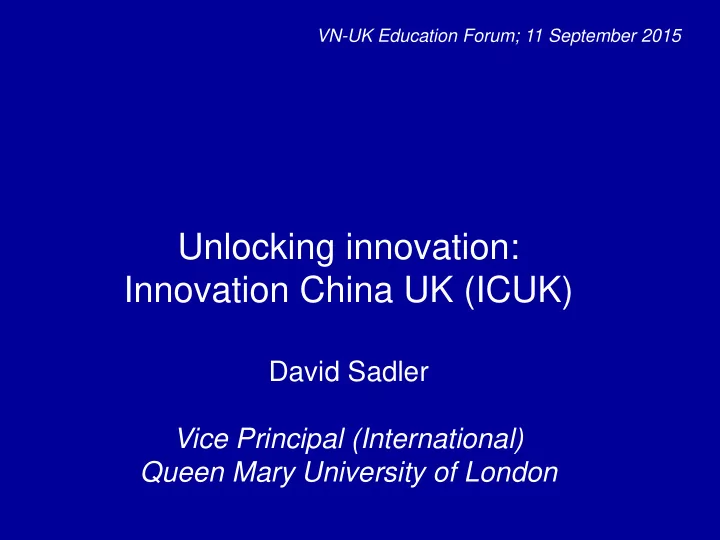

VN-UK Education Forum; 11 September 2015 Unlocking innovation: Innovation China UK (ICUK) David Sadler Vice Principal (International) Queen Mary University of London
Barriers to UK-China Collaboration and Knowledge Transfer Key issues other than language, culture and practice: • ‘I need to find the right collaborators’ • ‘I need funding’ • ‘I need to work with industry’ • Joint project management and performance management • How to protect the intellectual property and manage ownership • Does the technology ACTUALLY have a market • What is the best commercialisation strategy for this technology • How to share exploitation rights & benefits
Innovation China UK (ICUK)- Phase 1 • ICUK project launched in 2007 by 5 research intensive HEIs to promote knowledge transfer with China • Received £5 million in UK funding (HEFCE/BIS), with MoST co- ordinating funding in China • Focused areas: 1) Regenerative medicine and infectious diseases 2) Environment and energy 3) Nanotechnology and materials 4) Advance Engineering and ICT
Innovation China UK (ICUK) – Phase 1 • Collaboration development fund – two categories of award – ‘Partnership Grant’ & ‘Proof of Concept Fund’ • Technology Portfolio • Created Knowledge Network Collaboration Innovation Commercialisation Partnership Collaboration Development Technology Global Market Building Fund Transfer
Innovation China UK (ICUK) – Evaluation Outcomes • Partnerships initiated with over 50 Chinese HEIs • Over 100 industrial partners participated in R&D and commercialisation activities • 14 new patents filed • 5 joint projects with technology licensed to UK & Chinese companies • 1 UK spin-out
Innovation China UK (ICUK) – Evaluation • Most collaborations based on pre- existing links…BUT.. new and varied (both commercial and academic) contacts were made through the projects ICUK funded • In many cases the collaboration continued and follow-on funding obtained • ICUK built a reputation in China that helped obtain Chinese funding and other Chinese partners • Project Managers played a key role supporting project holders (in dealing with uncertainty and cultural differences) and raised awareness of ICUK services among University researchers
Sino-British Materials Research Institute Built on UK EPSRC and SCU support: • Workshops on Organic Spintronics, Biomaterials, • Energy Materials • 50 Academic Exchanges • Joint PhD programme • 250m 2 new laboratory including clean-room for organic electronics research (1.3m RMB support) • 7m RMB capital investment in equipment • 4 new full time staff (3 international) and 3 part time with 6 more to follow • 5m RMB in research grant applications in 2014 • Institute aspires to be world centre for hybrid organic/silicon photonics research in future
Innovation China UK (ICUK) – Phase 2 • Since 2011 ICUK programme office remains at QMUL funded by HEIF • Worked on 3 year initiative ‘UK -China Innovation & Knowledge Transfer’ funded by BIS in organising a series of events in support of technology partnering • Events focused on biopharma, agri-tech, sustainable building, Internet of Things, environmental protection and high-value manufacturing
Innovation China UK (ICUK) – Phase 2 Outcomes • Total number of funded R&D partnerships (projects): 20 • Total number of UK-China research centre established: 2 • Total number of business joint ventures: 5 • Total number of commercial agreements(distribution/licensing): 3 • R&D funding/investment secured from the UK(£): 5,107,000 • R&D funding/investment secured from China(£): 3,771,000
Innovation China UK (ICUK) – Phase 2 Outcomes cont. • Commercial income achieved so far (£): 1,568,250 (several participants have opted to keep commercial income confidential so this figure could well fall short from the actual incomes) • Estimated R&D and commercial incomes for next 5 years (£): 42,910,000
Lessons learnt Establishing a bilateral programme: • Consult, consult, consult • Understand the innovation framework of partner country • Consider the speed of decision-making • Be aware of policy framework & internal management systems • Influence policy through wide engagement • UK long-term commitment is needed
Lessons learnt Implementing joint projects: • Set expectations with partner from the beginning • Consider how to access local funding from the start • Be aware of differences in R&D management systems Other dynamics to consider: • Involvement of industry & concerns over IPR • Extent to which contract research, technology licensing and joint venture is currently practiced
Recommend
More recommend